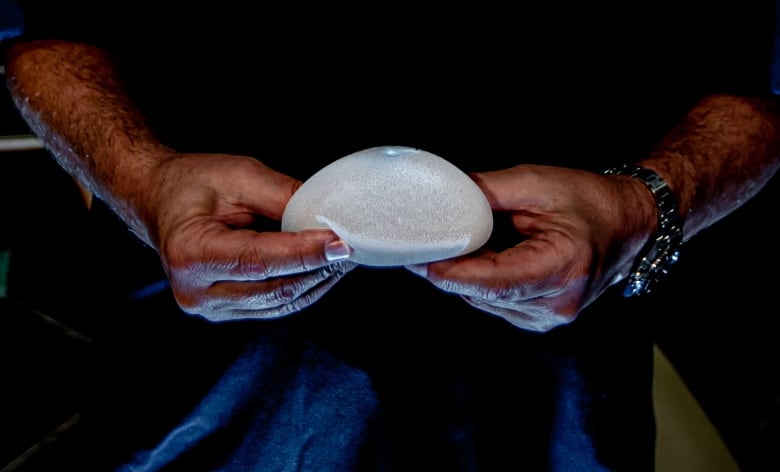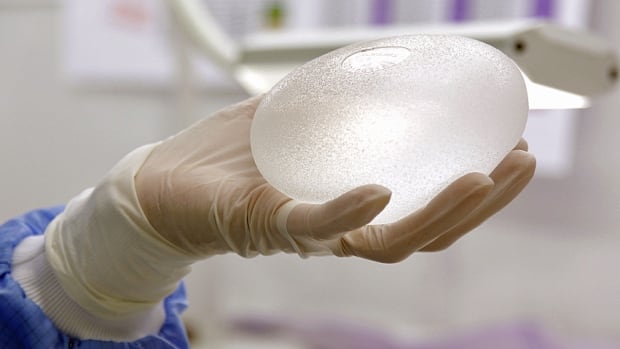Patients and doctors applaud the news that Canada may eventually have a national breast implant registry, describing it as a big step for public safety, but say it should have happened a long time ago.
At a meeting on Tuesday, the House of Commons Standing Committee on Health heard submissions for a study examining the feasibility of creating a national registry. The news follows years of advocacy by women who have been injured and joint investigations by CBC, Radio-Canada and the Toronto Star about the potential dangers of implants, which can include cancer and autoimmune diseases.
Julie Elliott, Canadian representative for the Breast Implant Safety Alliance and spokesperson for the Breast Implant Failure and Illness Society of Canada, said a registry with data on all implants in this country is long overdue.
“To me, this is something that should have happened when breast implants started being made in 1964,” she told CBC.
She argues that it is strange that foreign objects are placed in the human body with no way for patients and their doctors to track any issues with these devices.
“If you have a car and something happened with that car, there’s a recall, you’re going to automatically get an email or a card that you need to go to your dealership to fix that problem,” Elliott said.
The federal feasibility study will examine what information could be included in a national registry and how it might operate once in place.
Health Canada spokesman Mark Johnson said the federal agency will review the committee’s study and provide an official response at that time.
“Any next steps for a breast implant registry will be highly dependent on its purpose, structure, and design,” Johnson wrote in an email.
He described a breast implant registry as a “complex undertaking” that would require the involvement and coordination of multiple levels of government.
“No one wanted to take responsibility”
Some advocates argue that a national registry with details of every implant performed in Canada is needed to ensure researchers and patients can track disease, injury and other information.
Nancy Pratt says there have been calls for something like this since the 1990s.
Pratt, president of the British Columbia-based Breast Implant Failure and Illness Society, suffered permanent harm after breast implants she received in the 1990s ruptured. She later learned that her implants had been recalled , but no one had informed her.
“Everyone makes money from breast implants and no one wanted to take responsibility for following them,” Pratt said.
As recently as January or February of this year, she heard of women who had made discoveries similar to hers.
“Women are still finding out their implants were recalled in 2018, 2019 — and they had no idea,” Pratt said.
She added that any registry should not just be limited to implants, but should also include other materials like mesh and clips that can also be placed inside the body during implant surgery.
“Nobody should have a device that’s been recalled or has a safety warning and they don’t know about it,” Pratt said.

News of a potential registry came as somewhat of a surprise to Dr. Peter Lennox, clinical professor of plastic surgery at the University of British Columbia.
He remembers contacting Health Canada in 2017 to recommend the creation of a registry, in his role as an executive member of the Canadian Society of Plastic Surgeons and the Canadian Society for Aesthetic Plastic Surgery.
“Nothing progressed. We had several conference calls and meetings with them, and there was no resolution,” Lennox said.
Other countries are already doing it
Lennox said he was happy to hear that a registry could finally see the light of day, although there are many questions that will need to be answered first, including whether reporting is mandatory, who controls the database, who has access to it and how it is financed.
“There are many other countries that have very strong breast implant registries and there has been a lot of research done on what constitutes a good registry,” he said.
“They don’t have to reinvent the wheel.”
One such registry is in the Netherlands, where Dr. Jan Willem Cohen Tervaert began studying the complications caused by breast implants in the 1990s.
Now a professor of medicine at the University of Alberta, Cohen Tervaert said a series of scandals involving implant manufacturers have made records necessary.
“It is clear that the medical device industry and in particular the breast implant medical device industry needs more oversight, and the authorities are not doing it,” he said.

He cited the example of Poly Implant Prothèse, a French company that came to light in 2010 as selling industrial-grade silicone implants rather than the mandatory medical-grade product. The founder of the company ended up in jail for fraud accordingly.
“The problem there was that nobody had a registry of the implants. So while it said the implant had to be removed, nobody knew which patients had those implants,” Cohen Tervaert said.
He noted that in the Netherlands, the cost of the registry is now covered by patients, who pay the equivalent of around $40 when undergoing surgery. The registry operates on an opt-out basis, which is mandatory unless patients choose not to have their information included in the database.
